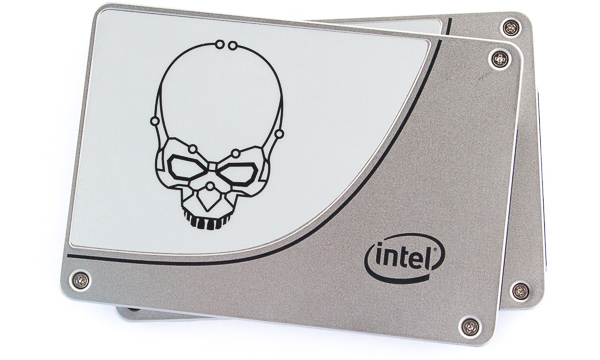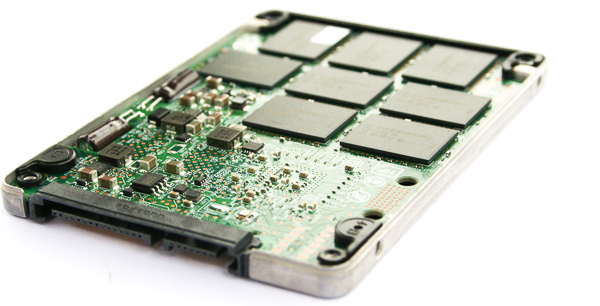The SSD 730 Series Review: Intel Is Back With Its Own Controller
It's Expensive, It Uses A Lot Of Power, But It's Fast
Word on the streets is that no self-respecting 11-year-old boy can resist computer hardware with a skull on it. It's probably a shame, then, that there aren't many 11-year-olds in the prosumer category, sporting wallets fat enough to drop twice as much money per gigabyte of capacity than competing SSDs.
With a load of benchmark data under our belts, we can make more enlightened recommendations, though. Intel's SSD 730 Series is fast, no doubt. It's an SSD DC S3500 at heart, and that's a very well-respected piece of solid-state storage technology. Better, the client-oriented version is optimized in all of the right ways for desktop and workstation use.
There's nothing wrong with enterprise roots. We're more demanding of our storage these days, and in some cases, features outweigh straight dollar-per-gigabyte calculations. In fact, we like that the SSD 730 isn't an entirely new platform. Jackson Ridge, the 730's code name, has an established track record already. Part of its good reputation does come from subtle nods to reliability, such as trapping the last four commands issued in the event of a drive failure, helping Intel diagnose the source of trouble. Ostensibly, that should lead to a better ownership experience over the product's life. A drive like this, modified for the varied workloads found in desktop environments, and you have a winner on paper (particularly when you get to keep the enterprise-class QoS).
Equipped with Intel's own eight-channel controller, 20 nm of NAND, and 1 GB of data cache, the SSD 730 is closely related to the enterprise-oriented SSD DC S3500. Though pricey at over $1/GB, this drive is covered by a five-year warranty and decidedly high-end.
Power consumption does suffer for the extra speed you're offered. In a high-end desktop or workstation, that's not a problem. But you won't want to use the SSD 730 Series in a notebook, even if it's a high-end one. After all, more power creates more heat, and that can be detrimental to performance. Ignore the mobile space altogether and you're able to do wonderful things like running a controller 200 MHz faster and speeding up the NAND interface.
There will be those who see the SSD 730 as a discounted SSD DC S3500 with better performance specs and love what it represents. Others will look to the large market of exceptionally fast client drives and balk at pricing in excess of $1/GB. It's a funny thing, though. We remember not too long ago when $1/GB was an exciting milestone. Truly, pricing is a relative yardstick. But with so many other very fast SSDs selling for so much less, it's difficult to specifically recommend paying more for this drive's benefits.
You already know that performance is what gets us excited. We're also hounds for value, though. And it's hard not to notice that for what you'd spend on two 480 GB SSD 730s, you could also get a pair of 960 GB Crucial M500s (and have $80 left over). Comparisons like that are powerful, and what the M500 might lack in speed or consistency, it makes up for with hardware acceleration of TCG Opal 2.0/eDrive. It even sports a power-loss protection mechanism of its own. Undoubtedly, the SSD 730 has the edge in rated endurance. But even that isn't the victory it appears to be on paper.
Get Tom's Hardware's best news and in-depth reviews, straight to your inbox.
It's clear that many smart individuals have determined how to best extract enthusiast-class performance out of what was already a rock-solid enterprise-oriented SSD platform. What we end up with is useful speed, rather than inflated marketing numbers. There will always be a market for the Core i7-4960X CPUs and GeForce GTX Titan Black graphics cards. Intel's SSD 730 falls into that same category of prohibitively-priced, but ultra-high-end hardware. If this is the drive for you, then you already know it from our description of its features and compelling benchmark numbers. Otherwise, we'd be inclined to point you in the direction of the Core i7-4930Ks and GeForce GTX 780s of the world, which are still smoking fast, but a little friendlier to your wallet.
Current page: It's Expensive, It Uses A Lot Of Power, But It's Fast
Prev Page Power Consumption-
blackmagnum That skull on an Intel SSD means this product is the Big Kahuna. Samsung just cannot crush this competition.Reply -
Amdlova that 480 drain more than a 5400rpm HDD. Samsung or sandisk for laptops. Please next SSDReply -
rokit Never expected Intel to fail like that. Samsung still offers the best performance/power consumption/$Reply
I guess that skull did the job, power of signs )
p.s. this site has level editing in non-forum mode(the one you see and use by default)
Watch the language. - G -
mamasan2000 I don't see why the Intel SSD is any good. It's midpack at best at everything. Even my cheap Sandisk is better and it was the cheapest SSD I could get around here (besides Kingston).Reply -
unityole how is samsung the best? http://www.tweaktown.com/blogs/Chris_Ramseyer/58/real-world-ssd-performance-why-time-matters-when-testing/index.htmlsandisk and toshiba SSD, look at the chart and see the performance for yourself. Evo doing well, but thats only cause of the SLC flash helping it.Reply -
eriko All this Samsung love here... I have two brand new 840 Evo 250GB drives, and they are garbage.In fact they are so poor, I had to separate all my files, and break the RAID,and have two individual volumes, so as to have Trim enabled, and also Magician running, otherwise, terrible read and write (especially) performance resulted. I did verify they were genuine drives too. As soon as you begin to fill up these 250GB Evos, performance falls off a cliff.I'm now not a believer in TLC, and wish I had waited to get the Pro's (not available in this part of the world), as I hear much better things about them.But I've had my fill of reading reviews on consumer drives, I'm going to California in a week or so, and so I will either get 2 x 400GB S3700's, or a single 800GB S3700 (and to hell with RAID). Enterprise drives are the bomb, and don't forget that. Lost way too much time and data now with 'consumer' drives...By the way, X25E 64GB still going strong without so much as a hiccup. Not even a burp... If they made a 640GB X25E, I think I'd suck their, ok, I won't say that but you get the idea.Reply -
zzzaac Just curious, this speed, would you be able to tell that it is faster, or is it just though benchmarks?.This ssd is quite expensive at my local parts shopReply

